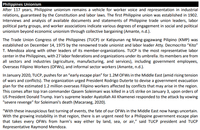
Understanding Business
12th Edition
ISBN: 9781259929434
Author: William Nickels
Publisher: McGraw-Hill Education
expand_more
expand_more
format_list_bulleted
Question
Base on the Case above propose ways in settling the labor dispute
between TUCP and the Philippine government give the different modes of settling labor disputes.
negotiation and give action plans
collective bargaining and give action plans
Grievance Machinery and give actions plans
medatation and actions plans
Conciliation and give actions plans
Arbitration and give action plans

Transcribed Image Text:Philippines Unionism
After 117 years, Philippine unionism remains a vehicle for worker voice and representation in industrial
relations, guaranteed by the Constitution and labor laws. The first Philippine union was established in 1902.
Interviews and analysis of available documents and statements of Philippine trade union leaders, labor
political party groups, and worker associations indicate various degrees of engagement in social and political
unionism beyond economic unionism through collective bargaining (Amante, n.d.).
The Trade Union Congress of the Philippines (TUCP) or Katipunan ng Mang-gagawang Pilipino (KMP) was
established on December 14, 1975 by the renowned trade unionist and labor leader Atty. Decmocrito “Kito"
T. Mendoza along with other leaders of its member-organizations. TUCP is the most representative labor
center in the Philippines, with 27 labor federations and organizations under its umbrella. Its members are from
all sectors and industries (agriculture, manufacturing, and services), including government employees,
Overseas Filipino Workers (OFWS), and informal sector workers (Amante, n.d.).
In January 2020, TUCP, pushes for an "early escape plan" for 1.2M OFWS in the Middle East (amid rising tension
of wars and conflicts). The organization urged President Rodrigo Duterte to devise a government evacuation
plan for the estimated 1.2 million overseas Filipino workers affected by conflicts that may arise in the region.
This comes after top Iran commander Qasem Soleimani was killed in a US strike on January 3, upon orders of
US President Donald Trump. Iran's supreme leader Ayatollah Ali Khamenei responded to the attack by vowing
"severe revenge" for Soleimani's death (Macaraeg, 2020).
"With these inauspicious fast turning of events, the fate of our OFWS in the Middle East now hangs uncertain.
With the growing instability in that region, there is an urgent need for a Philippine government escape plan
that takes every OFWS from harm's way either by land, sea, or air," said TUCP president and TUCP
Representative Raymond Mendoza.
Expert Solution
This question has been solved!
Explore an expertly crafted, step-by-step solution for a thorough understanding of key concepts.
Step by stepSolved in 7 steps

Knowledge Booster
Similar questions
- What are the different methods of resolving the disputes and the method’s advantages?arrow_forwardwhat are the greatest issues on conflict mangement in labor relations and collective bargain agreement?arrow_forwardIn terms of employment law, discuss the following: a) How a contract of employment can be terminated. b) Refer to the different types of dismissal and what remedies may be available to the employee.arrow_forward
- You employ 40 assemblers and 20 machinists. The Union files a petition with the NLRB to represent the assemblers and files 16 authorization cards. What might you do to cause the NLRB to dismiss the petition and what can the Union do to respond?arrow_forwardn employee was terminated for smoking in a no smoking area. The union claimed that he should be reinstated because the company failed to follow due rocess procedures. When the company and the union could not agree, this case was referred to arbitration and the arbitrator ruled in favor of the employee. How should the company respond? our Response The company should reinstate the employee and follow due process in the future. The company should appeal the case to the district court. The company should request a hearing by a three-member panel of administrative law judges. The company should appeal the case to the NLRB. Feedbackarrow_forwardWhat powers do mediators have to resolve labor contracts?arrow_forward
- How to utilize conflict management in collective bargaing and labor relations environments?arrow_forwardWhy are worker's compensation benefits the sole remedies for workplace injuries of employees, as discussed in Guy v. Arthur H. Thomas Co. and Suburban Hospital v Kirson? What is the “social contract” referred to in the latter opinion?arrow_forwardwhat are the protocols of conflict management in collective bargainging and labor relations?arrow_forward
- Please create an employment contract. You can decide to act as the employer or employee on the contract. Make sure to look at a variety of New York employment contracts and use the typical language seen in the contracts.arrow_forwardWhat is contract labor and how is it different from indentured servitude?arrow_forwardIf you were evaluating the fairness of a contract arrangement, what conditions would you look for to decide if the arrangement was fair to the workers?arrow_forward
arrow_back_ios
SEE MORE QUESTIONS
arrow_forward_ios
Recommended textbooks for you
 Understanding BusinessManagementISBN:9781259929434Author:William NickelsPublisher:McGraw-Hill Education
Understanding BusinessManagementISBN:9781259929434Author:William NickelsPublisher:McGraw-Hill Education Management (14th Edition)ManagementISBN:9780134527604Author:Stephen P. Robbins, Mary A. CoulterPublisher:PEARSON
Management (14th Edition)ManagementISBN:9780134527604Author:Stephen P. Robbins, Mary A. CoulterPublisher:PEARSON Spreadsheet Modeling & Decision Analysis: A Pract...ManagementISBN:9781305947412Author:Cliff RagsdalePublisher:Cengage Learning
Spreadsheet Modeling & Decision Analysis: A Pract...ManagementISBN:9781305947412Author:Cliff RagsdalePublisher:Cengage Learning Management Information Systems: Managing The Digi...ManagementISBN:9780135191798Author:Kenneth C. Laudon, Jane P. LaudonPublisher:PEARSON
Management Information Systems: Managing The Digi...ManagementISBN:9780135191798Author:Kenneth C. Laudon, Jane P. LaudonPublisher:PEARSON Business Essentials (12th Edition) (What's New in...ManagementISBN:9780134728391Author:Ronald J. Ebert, Ricky W. GriffinPublisher:PEARSON
Business Essentials (12th Edition) (What's New in...ManagementISBN:9780134728391Author:Ronald J. Ebert, Ricky W. GriffinPublisher:PEARSON Fundamentals of Management (10th Edition)ManagementISBN:9780134237473Author:Stephen P. Robbins, Mary A. Coulter, David A. De CenzoPublisher:PEARSON
Fundamentals of Management (10th Edition)ManagementISBN:9780134237473Author:Stephen P. Robbins, Mary A. Coulter, David A. De CenzoPublisher:PEARSON

Understanding Business
Management
ISBN:9781259929434
Author:William Nickels
Publisher:McGraw-Hill Education

Management (14th Edition)
Management
ISBN:9780134527604
Author:Stephen P. Robbins, Mary A. Coulter
Publisher:PEARSON

Spreadsheet Modeling & Decision Analysis: A Pract...
Management
ISBN:9781305947412
Author:Cliff Ragsdale
Publisher:Cengage Learning

Management Information Systems: Managing The Digi...
Management
ISBN:9780135191798
Author:Kenneth C. Laudon, Jane P. Laudon
Publisher:PEARSON

Business Essentials (12th Edition) (What's New in...
Management
ISBN:9780134728391
Author:Ronald J. Ebert, Ricky W. Griffin
Publisher:PEARSON

Fundamentals of Management (10th Edition)
Management
ISBN:9780134237473
Author:Stephen P. Robbins, Mary A. Coulter, David A. De Cenzo
Publisher:PEARSON